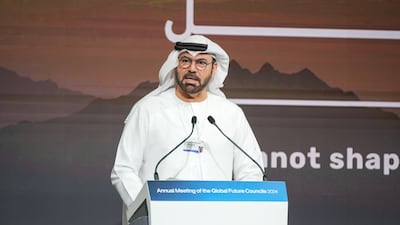Harnessing the rapid advancement of artificial intelligence will be at the forefront of a World Economic Forum (WEF) event taking in Dubai this week.
The Global Future Councils annual meeting, run jointly by the UAE government and the WEF, features 700 experts from more than 90 countries. The event runs from October 14 to 16.
Mohammed Al Gergawi, Minister of Cabinet Affairs, said the UAE was committed to empowering nations to participate in shaping the future.
“The world is undergoing rapid developments across various vital sectors, propelled by the fast-paced evolution of artificial intelligence and technology, and further exacerbated by growing cybersecurity challenges, a complex geopolitical situation, an economic system transitioning towards new models and ever-evolving social structures,” said Mr Al Gergawi.
“The Councils serve as a crucial reference for shaping a global, future-oriented thought process and visions, and developing tailored solutions for future challenges. They offer a prominent platform for sharing knowledge and experiences, facilitating international co-operation and rallying efforts to transform shared visions into constructive realities.”
Takeaways from the meeting will help to shape the official agenda for the WEF annual meeting taking place in Davos in January, he added.
“Shaping the future is a collective and global endeavour,” said Mr Al Gergawi. “No single nation can achieve it alone without co-ordination and joint efforts among governments, organisations and stakeholders across various sectors.”
The five pillars of Islam
UAE currency: the story behind the money in your pockets
Engine: 3.5-litre V6
Transmission: eight-speed automatic
Power: 290hp
Torque: 340Nm
Price: Dh155,800
On sale: now
UAE currency: the story behind the money in your pockets
UAE currency: the story behind the money in your pockets
COMPANY PROFILE
● Company: Bidzi
● Started: 2024
● Founders: Akshay Dosaj and Asif Rashid
● Based: Dubai, UAE
● Industry: M&A
● Funding size: Bootstrapped
● No of employees: Nine
The bio
Favourite food: Japanese
Favourite car: Lamborghini
Favourite hobby: Football
Favourite quote: If your dreams don’t scare you, they are not big enough
Favourite country: UAE
Ticket prices
- Golden circle - Dh995
- Floor Standing - Dh495
- Lower Bowl Platinum - Dh95
- Lower Bowl premium - Dh795
- Lower Bowl Plus - Dh695
- Lower Bowl Standard- Dh595
- Upper Bowl Premium - Dh395
- Upper Bowl standard - Dh295
Mobile phone packages comparison
Muslim Council of Elders condemns terrorism on religious sites
The Muslim Council of Elders has strongly condemned the criminal attacks on religious sites in Britain.
It firmly rejected “acts of terrorism, which constitute a flagrant violation of the sanctity of houses of worship”.
“Attacking places of worship is a form of terrorism and extremism that threatens peace and stability within societies,” it said.
The council also warned against the rise of hate speech, racism, extremism and Islamophobia. It urged the international community to join efforts to promote tolerance and peaceful coexistence.
More from Neighbourhood Watch:
Yemen's Bahais and the charges they often face
The Baha'i faith was made known in Yemen in the 19th century, first introduced by an Iranian man named Ali Muhammad Al Shirazi, considered the Herald of the Baha'i faith in 1844.
The Baha'i faith has had a growing number of followers in recent years despite persecution in Yemen and Iran.
Today, some 2,000 Baha'is reside in Yemen, according to Insaf.
"The 24 defendants represented by the House of Justice, which has intelligence outfits from the uS and the UK working to carry out an espionage scheme in Yemen under the guise of religion.. aimed to impant and found the Bahai sect on Yemeni soil by bringing foreign Bahais from abroad and homing them in Yemen," the charge sheet said.
Baha'Ullah, the founder of the Bahai faith, was exiled by the Ottoman Empire in 1868 from Iran to what is now Israel. Now, the Bahai faith's highest governing body, known as the Universal House of Justice, is based in the Israeli city of Haifa, which the Bahais turn towards during prayer.
The Houthis cite this as collective "evidence" of Bahai "links" to Israel - which the Houthis consider their enemy.

